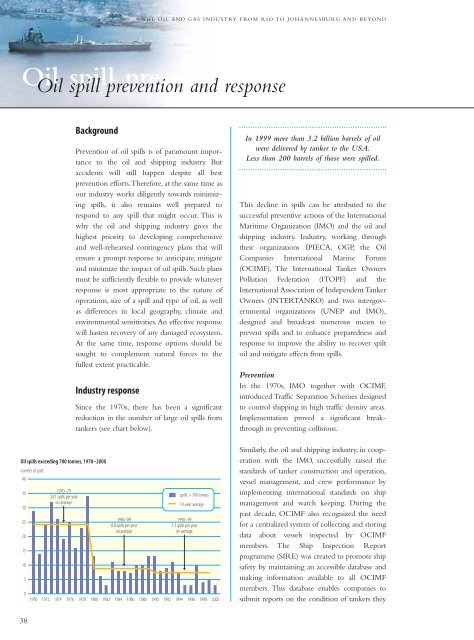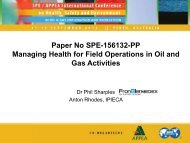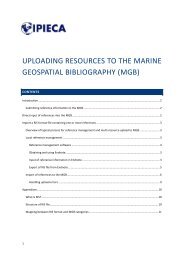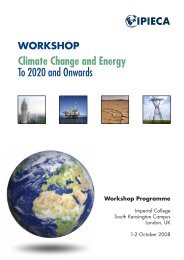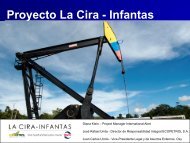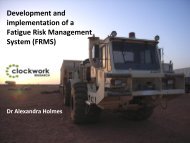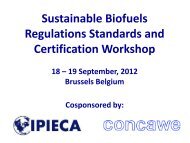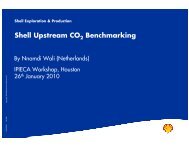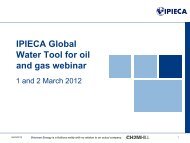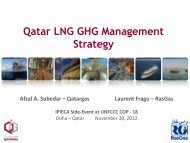WSSD Report FINAL! - OGP
WSSD Report FINAL! - OGP
WSSD Report FINAL! - OGP
Create successful ePaper yourself
Turn your PDF publications into a flip-book with our unique Google optimized e-Paper software.
THE OIL AND GAS INDUSTRY FROM RIO TO JOHANNESBURG AND BEYOND<br />
Oil spill prevention and response<br />
Oil spill prevention and response<br />
Background<br />
Prevention of oil spills is of paramount importance<br />
to the oil and shipping industry. But<br />
accidents will still happen despite all best<br />
prevention efforts.Therefore, at the same time as<br />
our industry works diligently towards minimizing<br />
spills, it also remains well prepared to<br />
respond to any spill that might occur. This is<br />
why the oil and shipping industry gives the<br />
highest priority to developing comprehensive<br />
and well-rehearsed contingency plans that will<br />
ensure a prompt response to anticipate, mitigate<br />
and minimize the impact of oil spills. Such plans<br />
must be sufficiently flexible to provide whatever<br />
response is most appropriate to the nature of<br />
operations, size of a spill and type of oil, as well<br />
as differences in local geography, climate and<br />
environmental sensitivities.An effective response<br />
will hasten recovery of any damaged ecosystem.<br />
At the same time, response options should be<br />
sought to complement natural forces to the<br />
fullest extent practicable.<br />
Industry response<br />
Since the 1970s, there has been a significant<br />
reduction in the number of large oil spills from<br />
tankers (see chart below).<br />
In 1999 more than 3.2 billion barrels of oil<br />
were delivered by tanker to the USA.<br />
Less than 200 barrels of those were spilled.<br />
This decline in spills can be attributed to the<br />
successful preventive actions of the International<br />
Maritime Organization (IMO) and the oil and<br />
shipping industry. Industry, working through<br />
their organizations IPIECA, <strong>OGP</strong>, the Oil<br />
Companies International Marine Forum<br />
(OCIMF), The International Tanker Owners<br />
Pollution Federation (ITOPF) and the<br />
International Association of Independent Tanker<br />
Owners (INTERTANKO) and two intergovernmental<br />
organizations (UNEP and IMO),<br />
designed and broadcast numerous means to<br />
prevent spills and to enhance preparedness and<br />
response to improve the ability to recover spilt<br />
oil and mitigate effects from spills.<br />
Prevention<br />
In the 1970s, IMO together with OCIMF,<br />
introduced Traffic Separation Schemes designed<br />
to control shipping in high traffic density areas.<br />
Implementation proved a significant breakthrough<br />
in preventing collisions.<br />
Oil spills exceeding 700 tonnes, 1970–2000<br />
number of spills<br />
40<br />
35<br />
30<br />
25<br />
20<br />
15<br />
10<br />
5<br />
1970–79<br />
24.1 spills per year<br />
on average<br />
1980–89<br />
8.8 spills per year<br />
on average<br />
spills > 700 tonnes<br />
10-year average<br />
1990–99<br />
7.3 spills per year<br />
on average<br />
0<br />
1970 1972 1974 1976 1978 1980 1982 1984 1986 1988 1990 1992 1994 1996 1998<br />
2000<br />
Similarly, the oil and shipping industry, in cooperation<br />
with the IMO, successfully raised the<br />
standards of tanker construction and operation,<br />
vessel management, and crew performance by<br />
implementing international standards on ship<br />
management and watch keeping. During the<br />
past decade, OCIMF also recognized the need<br />
for a centralized system of collecting and storing<br />
data about vessels inspected by OCIMF<br />
members. The Ship Inspection <strong>Report</strong><br />
programme (SIRE) was created to promote ship<br />
safety by maintaining an accessible database and<br />
making information available to all OCIMF<br />
members. This database enables companies to<br />
submit reports on the condition of tankers they<br />
38


